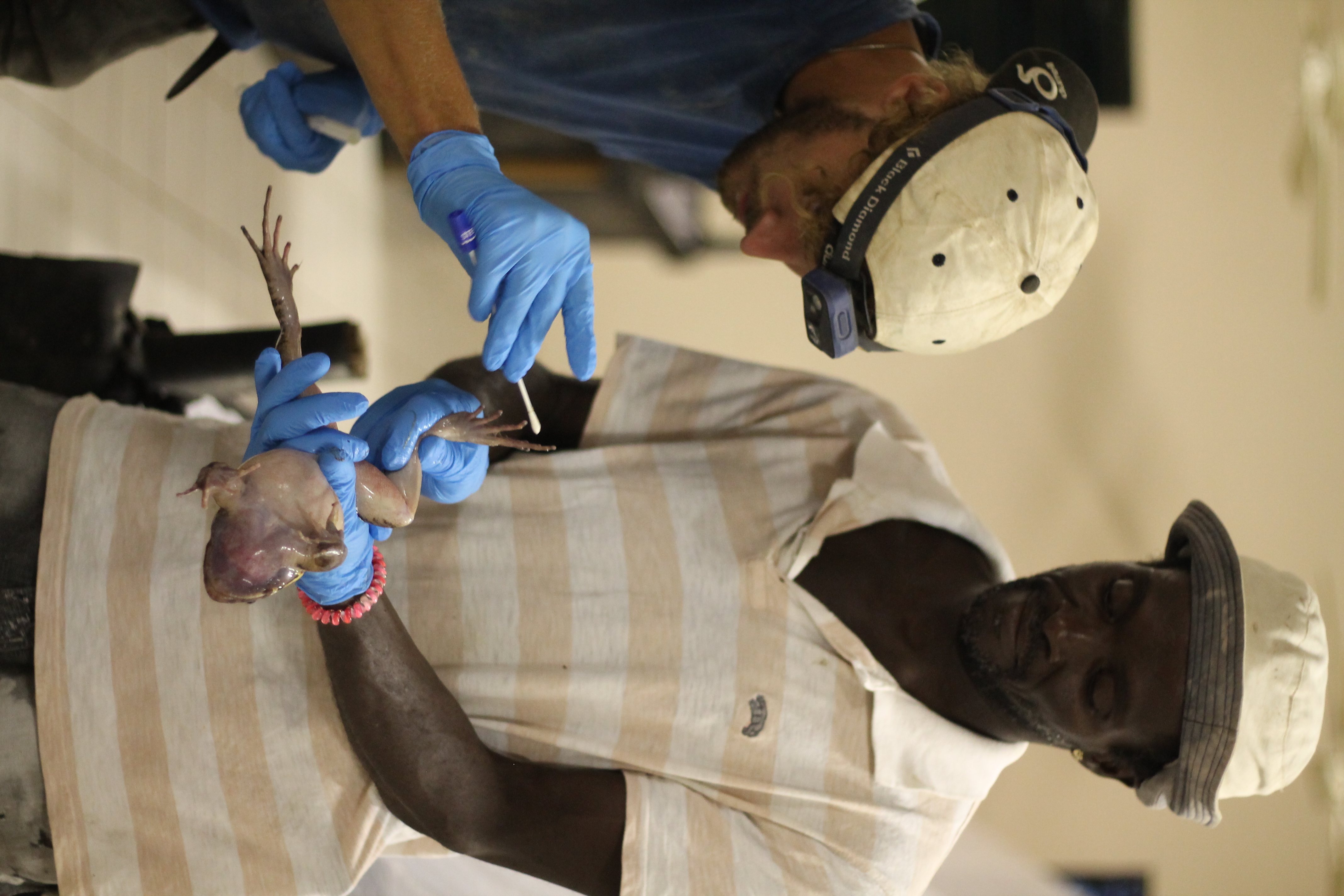 For the Critically Endangered mountain chicken frog (Leptodactylus fallax), 2020 has been a year of small but significant successes. The Mountain Chicken Recovery Programme, a partnership of international zoos, local NGO’s and Government stakeholders including Durrell, ZSL, Chester Zoo, Bristol Zoo and Norden’s Ark alongside the Governments of Montserrat and Dominica, the Montserrat National Trust and Wild Dominique have been working to secure and restore populations of the once-abundant mountain chicken to its native islands of Montserrat and Dominica. After the arrival of chytridiomycosis in Montserrat, the Mountain Chicken Recovery Programme established a captive bio-secure safety-net population across partner zoos. Over the following decade, successful breeding in captivity has facilitated four reintroduction attempts. Unfortunately, each of these ended with the population being lost within a year due to chytridiomycosis. There was, however, evidence of strong seasonality in the chytrid fungus risk, with much lower risk in the warm, wet seasons of these releases.
For the Critically Endangered mountain chicken frog (Leptodactylus fallax), 2020 has been a year of small but significant successes. The Mountain Chicken Recovery Programme, a partnership of international zoos, local NGO’s and Government stakeholders including Durrell, ZSL, Chester Zoo, Bristol Zoo and Norden’s Ark alongside the Governments of Montserrat and Dominica, the Montserrat National Trust and Wild Dominique have been working to secure and restore populations of the once-abundant mountain chicken to its native islands of Montserrat and Dominica. After the arrival of chytridiomycosis in Montserrat, the Mountain Chicken Recovery Programme established a captive bio-secure safety-net population across partner zoos. Over the following decade, successful breeding in captivity has facilitated four reintroduction attempts. Unfortunately, each of these ended with the population being lost within a year due to chytridiomycosis. There was, however, evidence of strong seasonality in the chytrid fungus risk, with much lower risk in the warm, wet seasons of these releases.
Last year the project carried out a 5th release, led by Durrell Wildlife Conservation Trust and Montserrat’s Department of Environment, of 27 captive-bred mountain chickens from Jersey Zoo and the ZSL into a semi-wild safe haven in Montserrat, designed to test the efficacy of novel habitat manipulation techniques to raise the temperature of areas within the SAFE haven throughout the year, mirroring the warm, wet season of low chytrid risk. This will take the form of a three-year study to assess if this intervention will enable the survival of this susceptible species in the presence of chytrid fungus. Whilst it is too early to tell whether the intervention will be successful on Montserrat, we have seen some encouraging signs in the first 12 months that the frogs are enjoying being home. After release, the frogs improved in condition, gained weight and males established and maintained territories. Whooping calls were filling the void they had left for so many years in the nighttime soundscape of Montserrat. The first foam nests appeared and just two weeks after, a writhing mass of tadpoles were seen in one nest, quickly followed by a second fertile nest. These represented the first confirmed fertile nests in Montserrat in over a decade! Unfortunately, with the greatest drought the Caribbean region in 80 years, the tadpole nests were abandoned by their parents. Given time, the project hopes to see its first juvenile mountain chickens returning to the island.
Durrell’s Luke Jones, Project Coordinator on Montserrat, says “to have successfully reached this milestone in the first year since release is absolutely phenomenal. There is still plenty of work to be done, as we look to determine whether our environmental manipulation techniques, can prevent or limit future outbreaks of the disease”. In a year fraught with global hardships, the achievements from the Mountain Chicken Recovery Programme offer a glimmer of hope. The first tentative steps have been taken in ensuring the survival of this species. Hope persists that it may one day assist in the development of tools to overcoming the impacts of Batrachochytrium dendrobatidis on amphibian populations.
By Rachel Haynes, Luke Jones, Jeff Dawson, Izabela Barata, Mike Hudson. Durrell Wildlife Conservation Trust (U.K.)
Photo: Jennifer Parker
